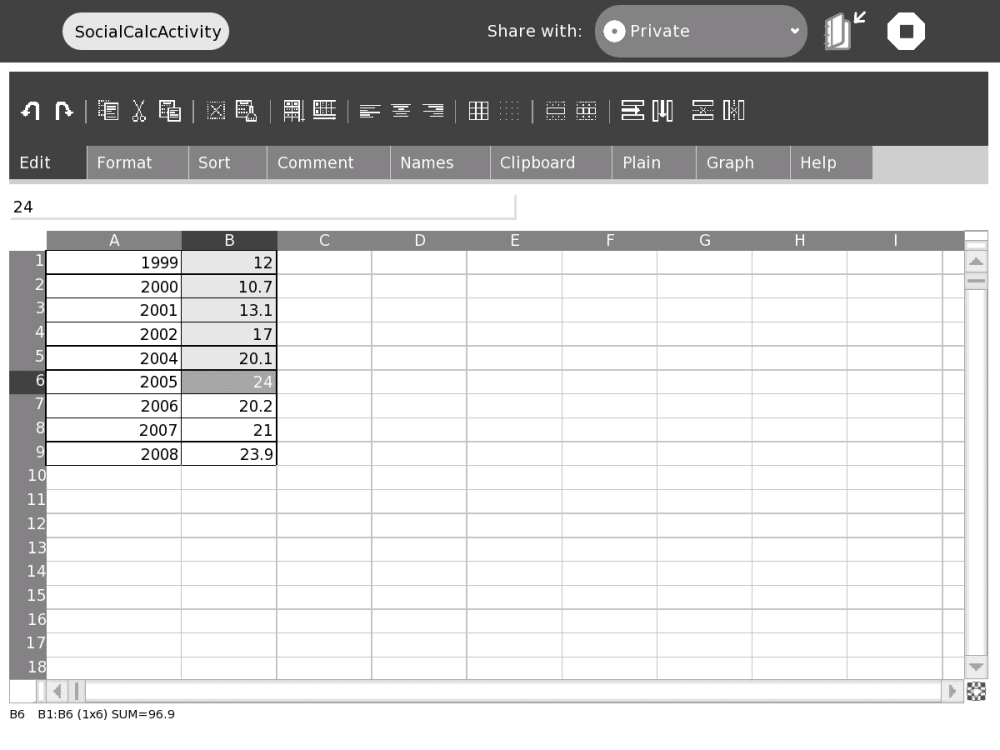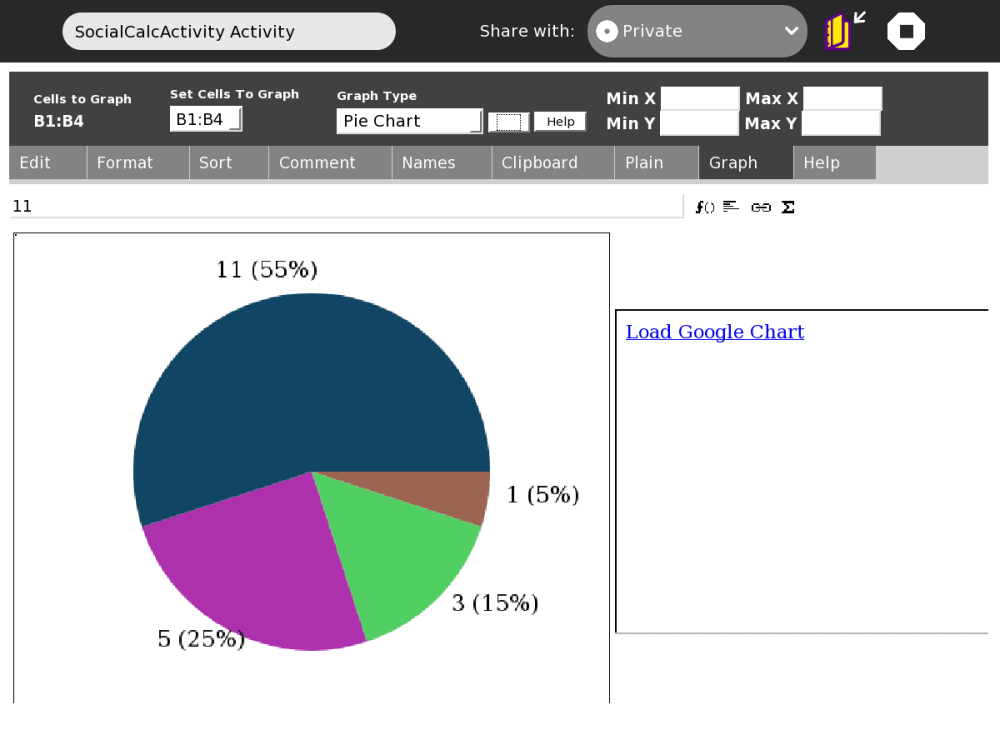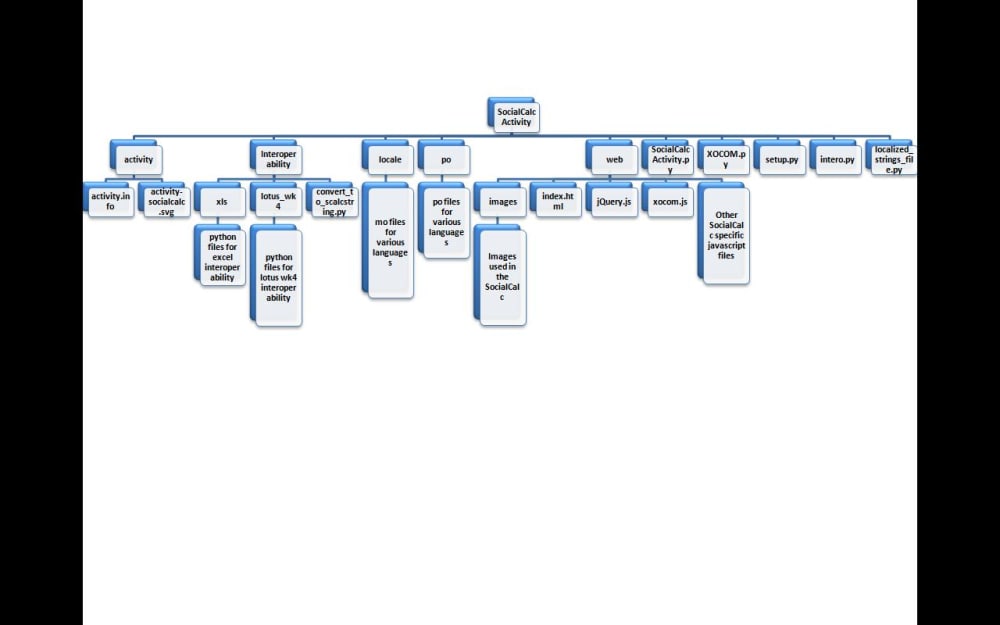One Laptop Per Child (OLPC) is an organization dedicated to create educational opportunities for the world's poorest children by providing each child with a rugged, low-cost, low-power, connected laptop (XO) with content and software designed for collaborative, joyful, self-empowered learning. As community engineers associated with this unique proposition, we have constantly evolved our programming skills to align ourselves with the mission statement and develop software for educational purposes.
SocialCalc is a spreadsheet activity developed for functioning in the Sugar environment, OLPC’s software paradigm. Initially coded by Dan Bricklin, Founder and President of Software Garden Inc. for Socialtext, Inc., the OLPC part was started by Manusheel Gupta, Managing Director of SEETA with K.S. Preeti, community friend of SEETA and alumnus from NetajiSubhas Institute of Technology and Luke Closs from Socialtext Inc. under the guidance of Walter Bender, Oversight Board Member at Sugar Labs.
The main idea of the Spreadsheet activity is to include features that would enable children to make easy use of the typical features of Spreadsheet activities such as organization, graphing and simple calculations in their respective languages. The main features of this spreadsheet activity are:
• Tabulation
• Organization
• Graphing and Calculation
• Localization in different languages
• Multi-user editing over the mesh network
• Ability to read and edit single sheet Excel 1997-2003 (.xls), Lotus (.wk4) and other popular
spreadsheet files
• Optimization in saving of sheet data.
• Collaboration over the Cloud
• Chat integration
Over time, SocialCalc has grown to become an innovative platform over which we have experimented on several accounts of collaborative learning. The basic framework of the application is as follows:
• Application – Spreadsheet activity called SocialCalc, written in JavaScript
• Platform – Python, integrated through XOCOM Library
• Infrastructure – XO Laptop and School server
Publications:
"SocialCalc: A Spreadsheet Activity for Computer Supported Collaborative Learning", Manu Sheel Gupta, K.S. Preeti, Vijit Singh, Proceedings of the 2010 Conference on Frontiers in Education: Computer Science and Computer Engineering, FECS 2010, Las Vegas, Nevada, U.S.A., CSREA Press 2010, ISBN 1-60132-143-0, pp. 304-309 URL - http://www.informatik.uni-trier.de/~ley/db/conf/fecs/fecs2010.html
"Implementation of Private Cloud Computing using Integration of JavaScript and Python", K.S. Preeti, Vijit Singh, Manu Sheel Gupta, The Python Papers Monograph, The PyCon Asia Pacific 2010, Singapore Management University Download URL - http://ojs.pythonpapers.org/index.php/tppm/article/view/149/161
"Spreadsheet on Cloud - Framework for Learning and Health Management System", K.S. Preeti, Vijit Singh, Sushant Bhatia, Ekansh Preet Singh, Manu Sheel Gupta, Proceedings of the EuSpRIG Conference "Spreadsheet Governance - Policy and Practice" ISBN : 978-0-9566256-9-4
Deployment in Uruguay - Plan Ceibal OLPC Deployment Project, Uruguay - http://www.youtube.com/watch?v=-7cPHg4XJKY
Community work with FCC (Federal Communication Commission) -
http://purplemotes.net/2009/09/13/universal-social-access-to-data-and-calculation/
Training Video by Dan Bricklin - http://www.peapodcast.com/sgi/socialtext/sctraining1/
Download - SocialCalc on Sugar page at Sugar Activities Catalogue - http://activities.sugarlabs.org/en-US/sugar/addon/4084
Video
Like this entry?
-
About the Entrant
- Name:Manu Gupta
- Type of entry:teamTeam members:Manu Sheel Gupta is the Founder and Chairman of the Software for Education, Entertainment and Training Activities and Co-founder, Director at Aspiring Investments Corp. Gupta has served as the former South-Asia Liaison at One Laptop Per Child(OLPC), where he acquired a wealth of experience in numerous technical and leadership roles. He worked closely with the governments and organizations in India and Sri Lanka to help build OLPC foundations in these countries. In the social profit sector, he has worked as the Director, Business Development at India School Fund. He has led efforts in developing environment friendly peer to peer software, and coauthored paint, spreadsheet, and e-book readers for OLPC laptops. He is a network security and ethical hacking certificate holder and an open source enthusiast.
Outstanding previous accomplishments
Constructionist Learning using Spreadsheet based models on Tablets
Conference Proceeding- Sixth International Conference of MIT’s Learning International Networks Consortium (LINC), MIT, Cambridge, Massachusetts, USA
Collaborating Towards Learning, Using Social Spreadsheets for Health Education and Community Awareness
Conference Proceeding- Sixth International Conference of MIT’s Learning International Networks Consortium (LINC), MIT, Cambridge, Massachusetts, USA
Special Award Presented to SEETA, 24th Global Contest, South Korea
The award was presented to SEETA on behalf of its remarkable results at 24th Global Software Contest hosted by IPAK and NIPA, South Korea.
Adviser/Mentor - Walter Bender is founder of Sugar Labs, which develops educational software used by more than three-million children in more than forty countries. Sugar Labs is a member project of the non-profit foundation Software Freedom Conservancy. In 2006, Bender co-founded the One Laptop per Child, a non-profit association with Nicholas Negroponte and Seymour Papert. As director of the MIT Media Laboratory from 2000 to 2006, Bender led a team of researchers in fields as varied as tangible media to affective computing to lifelong kindergarten. In 1992, Bender founded the MIT News in the Future consortium, which launched the era of digital news. Currently, he is launching a new initiative at MIT, the Open Learning Program, a forum for collaborative research among universities globally.
Bender received his undergraduate degree from Harvard University in 1977 and a masters degree from MIT in 1980, where he built the Electronic Publishing research group. He was a founding member of the MIT Media Lab, where he was a Senior Scientist and holder of the Alexander W Dreyfoos Chair.
Bender serves or has served on numerous boards and committees, including IBM's mobile computing advisory board and the GNOME technical advisory board. He is on the advisory board of the Squeak Foundation, the Center for Educational Technology (CET) in Israel, and Libre Corps, a new program at RIT that builds long-term, on-going relationships between university students and humanitarian organizations. He has held visiting faculty appointments at international universities, including the University of Tampere, and continues to serve on university research advisory boards and on occasion teaches at Hult and MIT Sloan business schools. Bender's book, Leaning to Change the World, on technology. learning, and social entrepreneurship was published in 2012.
Daniel Singer "Dan" Bricklin (born 16 July 1951), often referred to as “The Father of the Spreadsheet”, is the American co-creator, with Bob Frankston, of the VisiCalc spreadsheet program. He also founded Software Garden, Inc., of which he is currently president, and Trellix Corporation, which is currently owned by Web.com. He currently serves as the Chief Technology Officer of Alpha Software. - Software used for this entry:Sugar Platform
- Patent status:none








